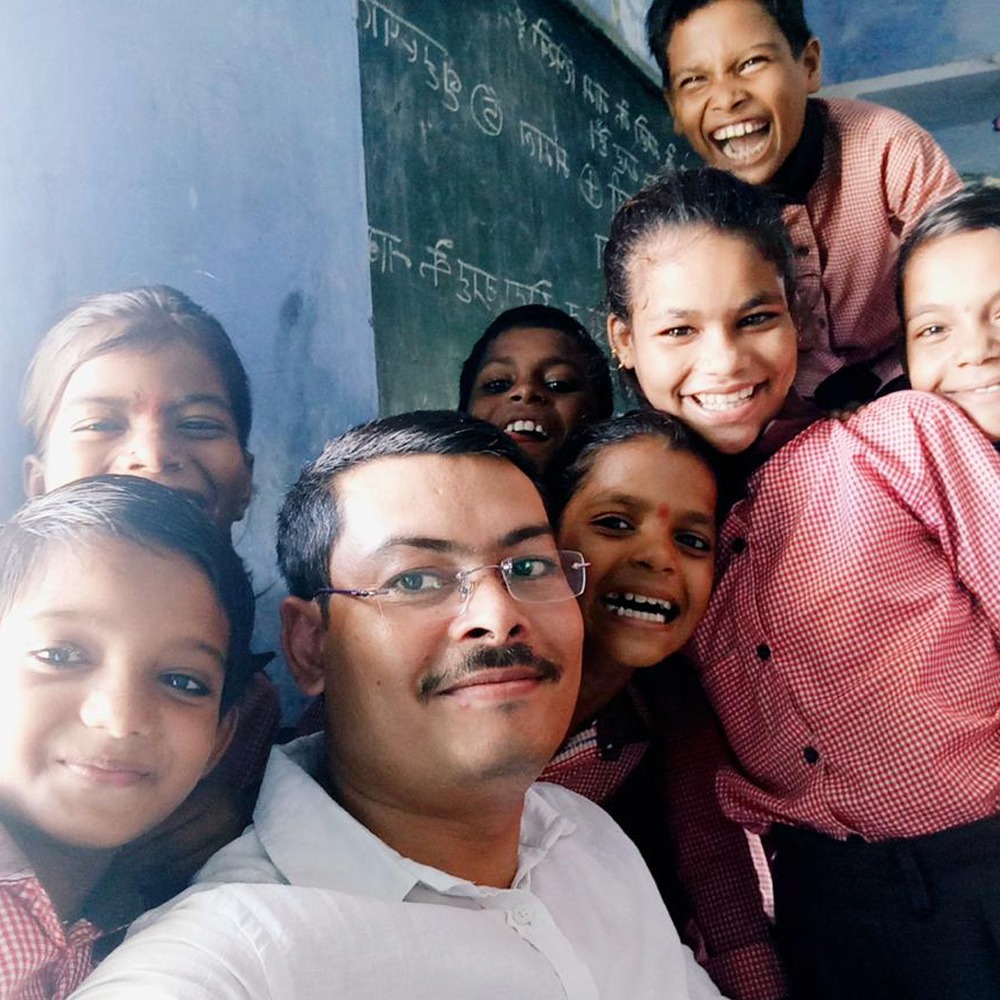
We, teachers, work hard to educate the future of our world, but when the Corona Virus started impacting lives worldwide, the whole idea of school education went through a massive change. I realised that the crisis is big and hence decided to do something about it. The first challenge was to bring all the students on the same platform without having to call them in classrooms. I created WhatsApp groups at school level and added as many students as possible. A teacher’s job is never complete if he/she is not learning something while teaching their students. Therefore, I took up all the new challenges which could help me strengthen the broken chain of the education system during COVID-19. I learned to create a YouTube channel, website platform, Facebook page and finally made one for my school at the block level. I also created a team called Rising Kothawa and started circulating an E-magazine for information flow. For virtual meetings between teachers group and academic resource person, I helped my colleagues on how to use meeting platforms. I might not have a degree or qualification such as doctors to help save the lives of people or like a soldier who is out there fighting for our country while keeping us safe inside. But I do have the power to learn and then teach the future of our country. Coronavirus pandemic must have slowed down the pace of development, but it’s not going to break our confidence and will power. I’m making sure that no kid in my area is missing out on their education.
Radhe Shyam(Teacher, Kothawa)
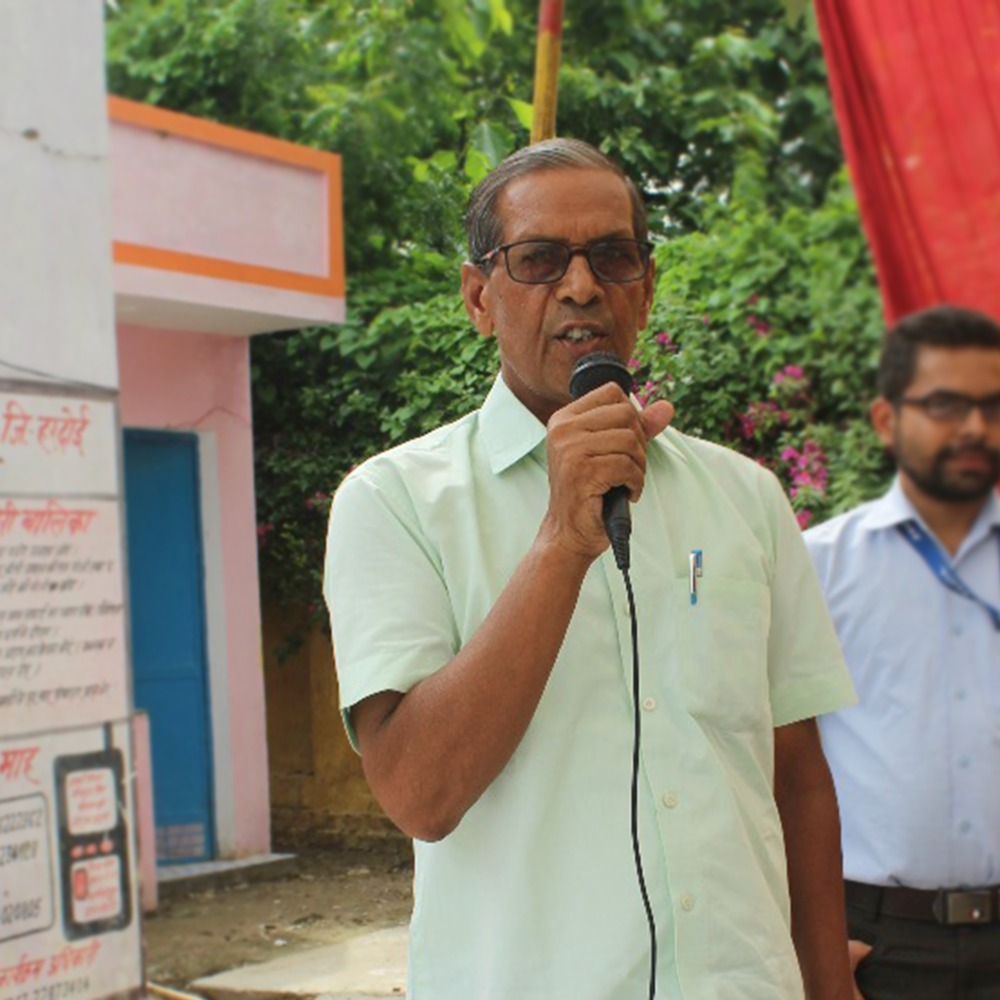
As a Gram Pradhan, it is my responsibility and duty to take the necessary steps to ensure the safety of my people. Therefore, from the time pandemic started hovering over our heads, I realised it is crucial to make people understand what they are up against. We started utilising e-rickshaws for public announcement. They moved from one village to another of the gram panchayat, circulating message on corona spread and what can we do to protect ourselves. The next step was to make sure that all the villages are sanitised, and people coming from other places were kept in quarantine with strict instructions of no contact whatsoever. The third step was to ensure the sanitisation of the most crowded places in a village. As ration shops are one of the most sensitive areas, we kept sanitiser for people. Soap and water were kept for ration distributor so that they keep cleaning their hands at regular intervals. We also make sure that people do not assemble in one place. I try and head out at regular intervals to check the condition of health and safety facilities in the gram panchayats. I know it’s risky, but I also know that my people are my responsibility. Just by making rules and regulations, things won’t work. They will work with effective management and care. I have earlier worked in the health department of my block, I stay in continuous touch with them to keep myself updated and try my level best to save people of my GP from this pandemic.
Ramswaroop(Gram Pradhan, Gogawanjot, Bahendar)
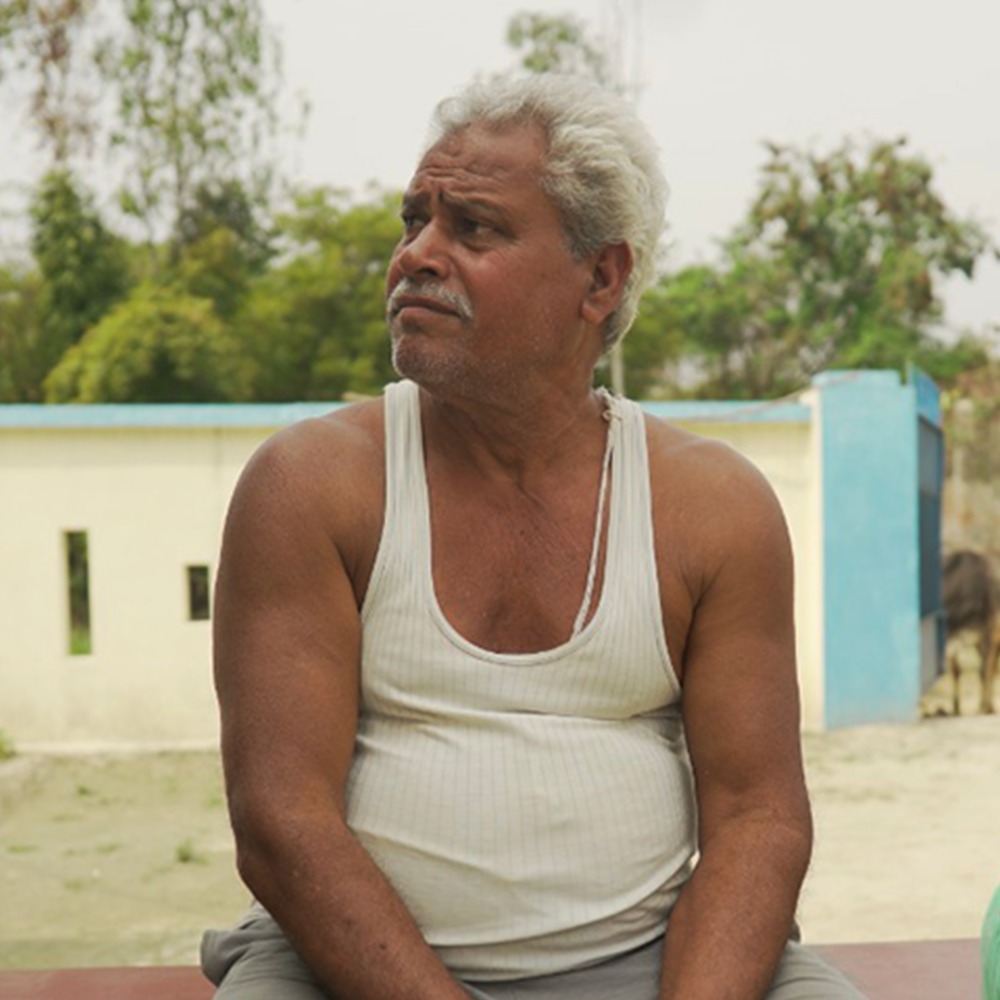
If people are advised to stay at home because of an unknown threat and when your job is to make sure that they are getting basic necessity such as water, what do you do? You don’t even think twice. You just do your job and help others! I’m from a village called Purwa in Hardoi, Uttar Pradesh. There is an Over Head tank built on my property which ensures potable water supply to 180 households. When the government announced the lockdown, water demand was already at a high due to Summer Season & arrival of migrants in the villages only increased it further. I got worried about the village hygiene situation. But then the situation demanded active participation too. I have always believed that ensuring safe sanitation practices and access to safe drinking water, minimises the health hazards, and it will surely help reduce the ill effects of COVID pandemic. Therefore, I never stopped my duty. I have been making water supply available three times a day. During the lockdown, I also managed to convince 20 new families to get a water connection and ensure safety during this pandemic. I’m still trying to convince all the people around me to get safe drinking water supply. We do not get this life, again and again; therefore, we should work towards protecting it. I take all the safety measure when I walk outside of my house to collect the contribution amount from households or to speak to new families. All I want back are the days where everybody can talk to each other again without any hesitation but also have a safe drinking water supply at their home!
Virendra Bajpayi(President, Village Water and Sanitation Committee, Purwa Village)
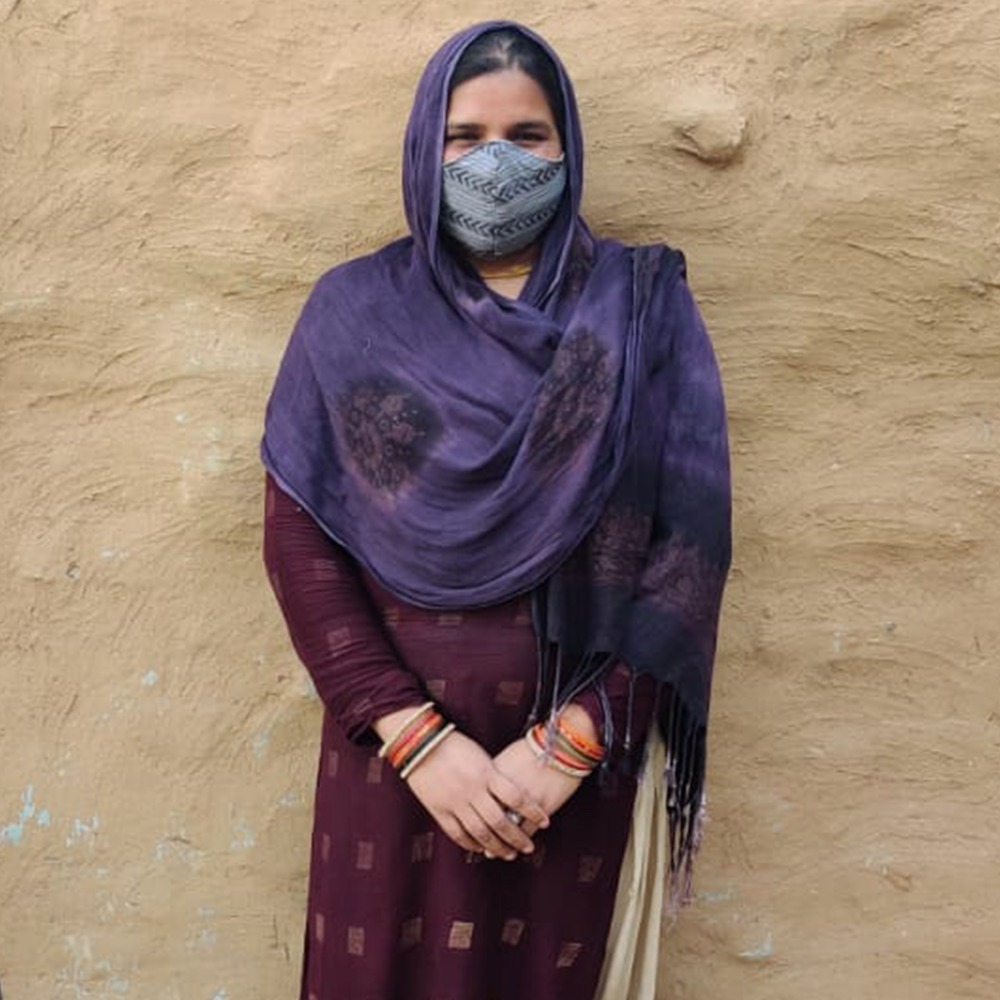
Ever since the lockdown, all the women in my area were feeling helpless! We had no work and used to wonder what will finish us first - the virus or hunger? I'm an artisan and the leader of handicraft CIG (Common Interest Group) of Taat Embroidery in a village of Kachuana Block, Hardoi, Uttar Pradesh. It became my aim to provide or figure out a way for the women of our rural communities. We have been finding ways to contribute meaningfully to safety efforts amidst the current pandemic while parallelly looking for opportunities to provide a livelihood. Hence we decided to manufacture 1 Lakh protective face covers by capacitating rural women in need. These women, who used to make intricate embroidery or shibori are turning their hands to making face covers. I always wanted to bring a better opportunity for my community. In the process to help others, I managed to encourage nearly 25 women around me. I used to regularly head out, visit these women and train them to make the face covers while simultaneously monitoring the quality, maintaining production record and keeping regular checks on the availability of raw material. Our group made 40,000 masks in the first 45 days and have managed to earn Rs. 4700 each at a time when there was hardly any income. During the lockdown, all our orders got cancelled! I was sad about the condition of women who used to work with me. Today, it gives me immense pleasure that I could help them train and earn in such hard times. This journey of mine isn't limited. I wish to donate the face covers to people who cannot afford to buy them. This way, I will be able to help people fight this pandemic.
Madhu(Artisan, Kachhauna)
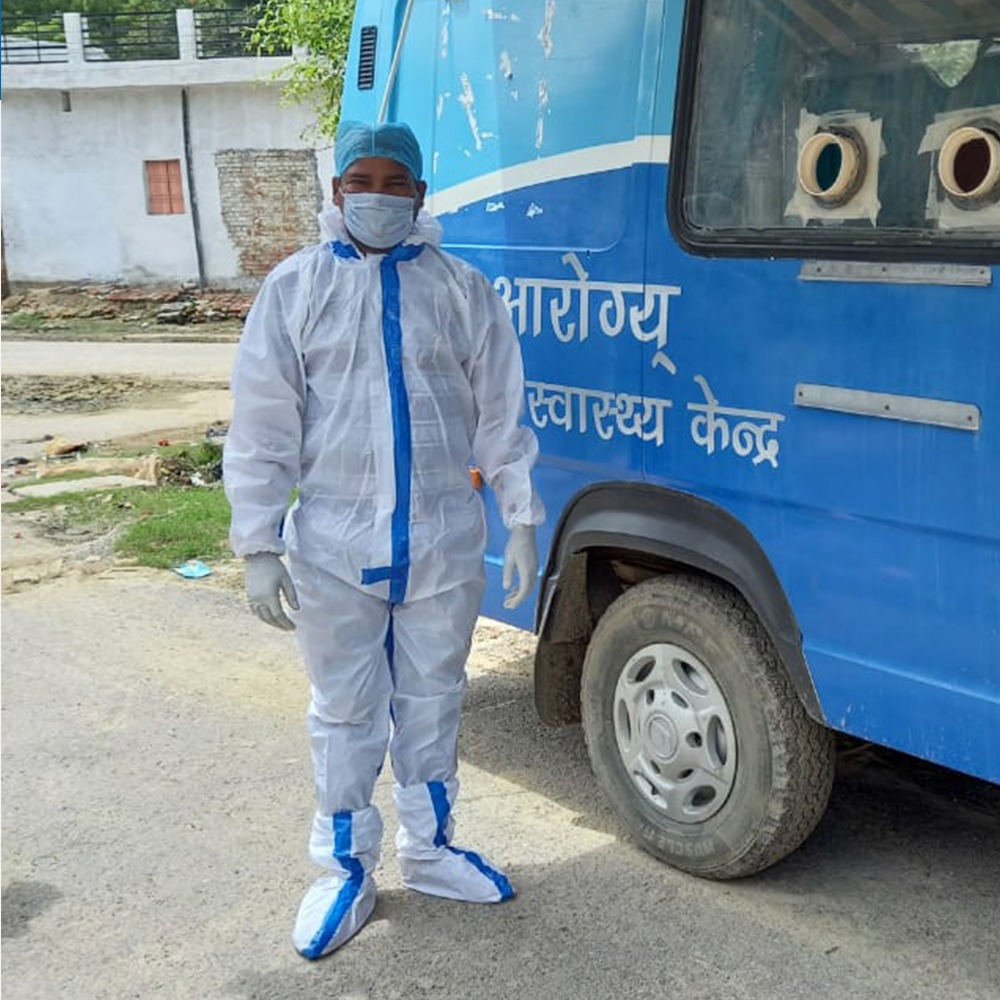
“It’s hard you know, to head out and work when the whole world is trying to save their lives and their loved ones from a threat that we can’t see or predict. I’m from a small village in Hardoi, Uttar Pradesh. In the first few days of lockdown, no one had a clue as to why we were advised to stay inside, what is happening! I work as a driver for the Mobile Health Clinic. So, naturally I had to go to work when everyone was told to stay at home. The Mobile Health vans that we drive are being used by the health department of the district to test for COVID-19 patients. During my duty, I have to wear PPE suit continuously for 5-6 hours till the samples are taken. It becomes hard to move in these PPE suits. On the days when it’s very hot it becomes all the more tiring and stressful to be in these suits. But we try and support as much as possible. We also help in giving instructions and managing the crowds so that they adhere to social distancing and in return help all the community members. When I started working during the Lockdown, I was scared as I did not know what I’m up against and what the disease does! All I had seen and read was through the news channels or via newspapers. But I still go out carrying courage and positivity with me because somehow or the other even while risking my own life I’m able to help others. Also, why should I fear when Lord Hanuman is there to protect me all the time. The lab staff gives us the correct information and motivates us by telling us the importance of our work and how many lives we are helping save. It’s a mixed feeling, but I’m proud of what I’m doing. I hope that the disease ends soon and we can go back to our normal lives.”
Mr Vipin Kumar(Driver – Mobile Health Clinic)
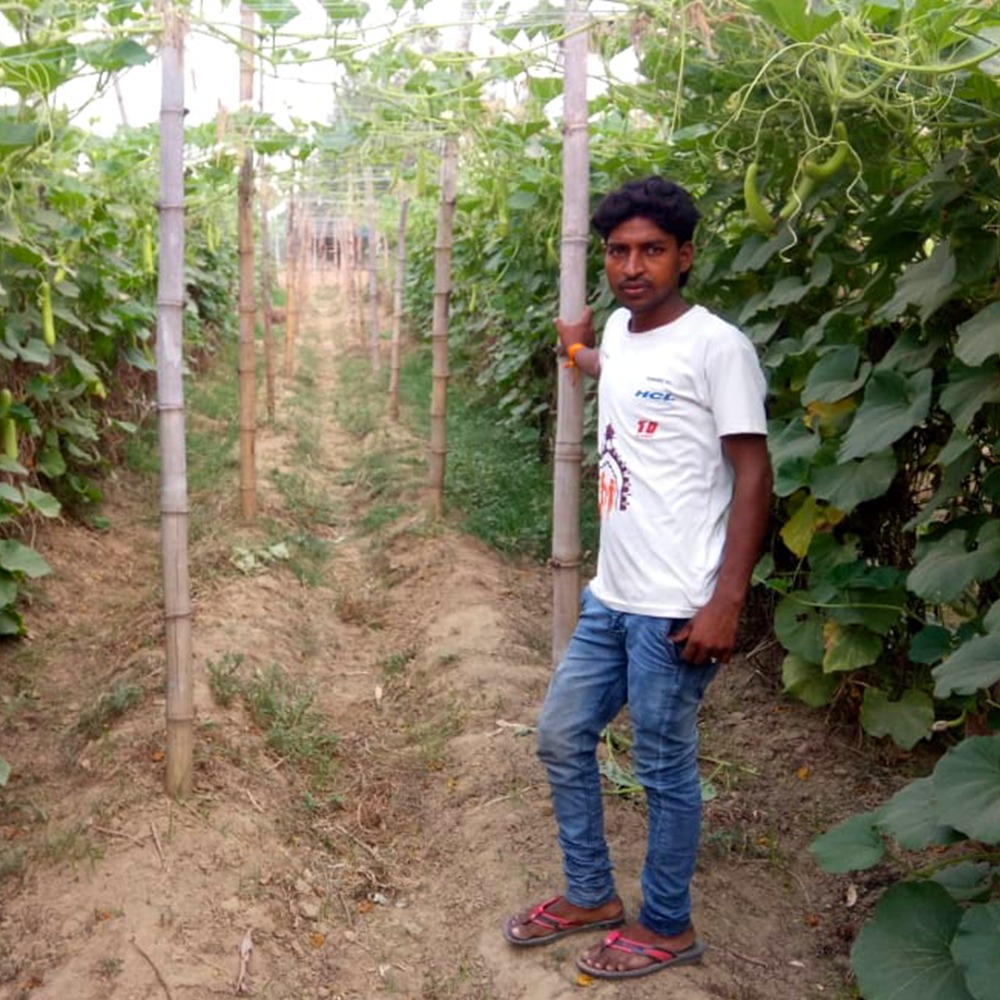
“I’m a farmer from a small village in Hardoi district of Uttar Pradesh. During COVID-19 lockdown, one of the many problems we farmers faced was the lack of transportation. March is an important month for the harvest of vegetables in our area and because of their perishable nature, it was not possible to store it at the village level even for 1-2 days, we needed to take our produce to the market. But even after getting the good harvest, we had no means to reach the market. Police and authorities had sealed the roads due to COVID-19 and our safety. We were scared as nothing was clear. I knew I had to do something then because earning money was important for not just me but all the farmers. I got aware of the rules, regulations and procedures to carry out essential activities during the lockdown. After knowing the process, I got a pass issued from the Mandi Parishad of Dubagga Mandi in Lucknow. I availed the pass for two vehicles and started helping as many farmers as possible. I began transporting their harvest in the nearby mandi of Lucknow and Hardoi. Every day, I used to make two rounds to the mandi to ensure that most of the farmers are benefitting from it. Last year we sold our tomatoes in Kathmandu mandi, this year the traders of that mandi started sending their vehicles in our village with empty crates. We filled those crates with tomato and got our money the next day. It was a huge relief for us. We managed to sell around 30 tonnes of tomatoes to those traders. I knew that with every round I was making to Mandi, I was putting myself at risk but what sort of a person I would be if I didn’t help people around me. They needed money to run their house. I’m happy I could help farmers from 5 villages. We will pull through these difficult times together!”
RajeshFarmer, Patti Village
Rampyari, a resident of Barauli Gram Panchayat, is one of those leaders whose energy and enthusiasm has spread like a wild fire inspiring many in her village to be self-dependent.
With an objective of developing alternate sources of income for her family, she first associated with HCL Samuday to develop a Small Poultry Shed. She further diversified her livelihood options by entering in the area of Goat Rearing and also ensured daily availability of organic vegetables for her family by setting up a nutrition garden in her own backyard.
But this was just the start of her journey. She found her calling in handicrafts when she saw the various interventions through which HCL Samuday was trying to develop traditional crafts of the region. After enrolling in the program, she not just motivated other members of her Self Help Group to join the program but also motivated 14 other women to come together and expand the budding business.
The new Rampyari, confident and ambitious, took on a journey to Delhi and closed a deal with a leading apparel brand. This proved a new dawn for young aspiring woman. From having no income or earning just ₹ 500 monthly, the women of this group were able to increase their income to ₹3500 monthly.
Rampyari has the #PowerToEmpower.
Shiv Devi, an Aanganwadi worker at Suthena village, is one of those natural leaders who are self-triggered to make a difference. She lost her husband early in life and her kids stay away, yet every morning she goes around on her bicycle to spread messages about importance of safe sanitation and clean drinking water.
She is a part of Village Nigrani Samiti and makes sure that nobody in her neighborhood defecates in the open. Being an Aangawadi worker, her regular work involves house-to house visit and she effectively utilizes it to spread WASH message.
She also volunteered to become part of the Village Water and Sanitation Committee (VWSC) and took responsibility of motivating 20 families and collecting contribution from them. Till date she has collected ₹22,000 on her own. As a result of her tireless efforts, today people of Suthena realise that the water they drink from shallow handpumps is contaminated with Nitrate and Fluoride which is detrimental to their health and wish to adopt piped drinking water supply as soon as possible.
Shiv Devi has the #PowerToEmpower.
Rajni, a resident of Gaju gram panchayat, presents a case of fighting against the odds of daily life and coming out victorious. She has seven children – two sons and five daughters. Life was fine for her till she lost her husband due to a heart attack in 2012. This unfortunate event brought responsibility of the entire family upon her and she started finding it impossible to manage everything from household income.
HCL Samuday’s ongoing interventions in the panchayat presented Rajni with an opportunity to engage in livelihood opportunities and support her family. Women from her defunct Self-help group were brought together and capacitated to run it successfully. It is from this group that Rajni regularly gets small low-interest loans for any urgent work. Using such funds, HCL Samuday facilitated her in setting up a backyard poultry unit with 100 chickens. It was the money generated from this enterprise that helped Rajni meet ends and bring up her children well.
Rajni’s story has inspired all women folk in the panchayat and various women groups are now planning to begin working on making home cleaning brushes, agarbatti (incense sticks), sewing, embroidery, etc.
Rajni has the #PowerToEmpower.
The story of Sharma Devi is not of one in a million but culmination of dreams of millions of Indian rural women in one pair of eyes. Born and married in an agricultural family, Intermediate (+2) was the highest level of education she could attain. With only a single teacher in the Govt. primary and upper primary schools during the past decades and poor connectivity to the Intermediate college she is easily the most qualified person of her age and gender in the village.
In August 2018 one of the most ambitious and successful initiatives of HCL Foundation, Shakshar Samuday (Adult Literacy program) took flight from Kachhauna and with it flew the dreams of Sharma Devi of putying her education to good use. “Passing the basic literacy test was not as difficult after the 5-Days training” she says. With two small school going kids and scarce means of transportation, visiting the HCL Training Centre was a demanding task for her but her persistence paid off when she passed the Post Training Test with highest grades. Thus began her journey of being a Community Literacy Volunter. Bold and beaming with confidence she says “I used to speak very little and nobody knew my name, but today everybody in my village and the neighbouring village recognises me. Even the village elderlies call me Sharma Didi because I teach them”. Initial months were the toughest, she had to regularly visit several households to ensure higher learner attendance, struggle with the nuances of the Laptop and ICT Modules and balance relationships between being a mentor and being a village bride.
Till date she has managed to impart literacy to more than 80 women across various age groups from 15 and above. It not only gave her an identity but encouraged her to look for better ways to contribute to the family. Thanks to changing perspective, apart from being sincere members in the Adult literacy, her SHG is now involved in several Livelihood generation activities such as making Pickle and Chips that act as opportunities for income enhancement of many women in the village.
Sharma Devi has the #PowerToEmpower.
Training and Extension
Agriculture is a dynamic sector that deals with specialized knowledge which is ever changing. HCL Samuday regularly makes associated farmers aware of latest developments through Training and Extension intervention. The farmers are empowered to address existing issues and mitigate and adapt for future challenges.
With the objective of bringing agriculture technologies at farmers’ doorstep by establishing a ‘Center of Excellence’ in Uttar Pradesh, HCL Samuday is setting up Center for Agriculture Technology Transfer (CATT) in Hardoi district. It shall act as a ‘single window’ / ‘one stop support system’ aligning various interventions of state department of Agriculture with HCL Foundation as an intermediary and farmers as end users in a learning, decision making and problem-solving exercise.
Nutrition Garden
Nutrition Garden is a low cost, scientific model of home garden organically producing a variety of nutritious vegetables and fruits throughout the year. The primary objective of promoting nutrition gardens is to make ½ kg of fresh vegetables available for daily consumption to rural households. Secondary objectives include reduction in daily expenditure of HHs and increase in the consumption of green vegetables for improved nutrition.
2,714 households have benefitted by adopting a Nutrition Garden.
Community Mobilization and Institution Building
Interventions aimed at mobilizing community and facilitating institution creation lend long-term sustainability to the efforts for agriculture development.
a. Farmer Clubs
Farmer Clubs are formed with the objective of propagating the idea of collective, uniting farmers in groups which work for the benefit of their community. 199 such clubs established so far under this intervention are providing a platform for knowledge dissemination and better market linkages.
b. Farmer Producer Organisation
HCL Foundation is the promoting agency of Hardoi Kisan Producer Company Limited (HKPCL), a Farmer Producer Organization constituted in 2017 to address challenges faced by farming community in the project area. Comprising of 2,350 shareholders and governed by an 11-member board of directors, HKPCL registered a turnover of ₹ 6.85 crores in last financial year (2019-20).
c. Vegetable Aggregation Points
Ensuring market is a crucial part of vegetable supply chain. To facilitate better linkages with market, 7 vegetable aggregation points have been set up across 3 blocks and regular communication is made to enable farmers to choose and opt for most suitable option. Realising better prices for produce, 917 Tonnes of vegetables, worth ₹ 1.30 crores, got aggregated at these centres in 2019-20.
d. Farm Mechanization
Through Farm Mechanization, focus is on increasing income of farmers by improving affordability and accessibility of machines for precision agriculture. It is aimed at reducing farmers’ cost of cultivation and easing farm operations. Carried out in an entrepreneurial model, thus far 3,249 farms have been supported with advanced agricultural machinery and development of 45 entrepreneurs has been facilitated.
Crop Diversification
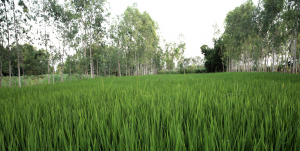
After successful response of vegetable cultivation, various add-ons in Crop Diversification have been introduced so that farmers having disparate needs may opt for most suitable cropping pattern. These include –
- Nano Orchard- a small area of land ranging from 840–1680 sqm is devoted exclusively for cultivation of fruit crops like Guava, Papaya, Banana, Apple, Ber and Thai Lime (seedless) along with vegetables taken as intercrop. 425 farmers have successfully established Nano Orchards.
- Floriculture - promoting flower cultivation, HCL Samuday is propagating better practices and solving farmers’ erstwhile problem of unavailability of good variety. Marigold cultivation is being promoted under floriculture in project area.
- VASUNDRA -Village Action for Sustainable Utilization of Natural Resource and Demonstration of Resilient Agriculture (VASUNDRA) has been initiated to enhance productivity of degraded fallow lands having high pH value. Adopting scientific methods of land reclamation through cultivation of resilient crops like Lemon Grass and Palmarosa combined with PH resistant horticulture crops like Amla, Ber and Lemon, so far 140 acres of land has been reclaimed.
Traditional Crop Promotion
Traditional Crop Promotion intervention focuses on training and demonstration of traditional crop farmers (Maize, Paddy, Wheat, Urad etc.) and bringing them under Package of Practices (PoP) based production system to increase productivity and adopt better crop management practices. 
HCL Samuday has worked to enhance productivity by adopting soil and nutrient management, land development and institutional building for effective market linkages. 26,000+ farmers are currently engaged through this intervention and have adopted better practices on their farm.